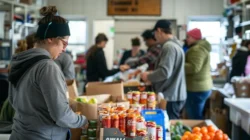When Molly Jaye Moses (CAS ‘08) finally heard from her family in Biloxi, Miss., her mother said they had found her car on Highway 90, just where they had left it. They said it had a full tank of gas but that a small boat was sitting on top of it.
That was on Friday, nearly a week after Hurricane Katrina hit the Gulf Coast. Her father, the Chief of Surgery at Gulfport Memorial Hospital in Gulfport, Miss., had been out of the office for a several days.
His co-workers assumed he was dead, and every time Moses called to look for him, the hospital employees put her on hold instead of comforting her.
Her family weathered the storm at a local hotel, far from the banks of the Tchoutacabouffa River. Her mother weathered Hurricane Camille in 1969, once considered the most destructive in U.S. history, and said that Katrina was far worse.
“Everything I knew and grew up with is gone,” Moses said.
Moses is one of many Georgetown University students whose families were affected by last week’s catastrophe on the Gulf Coast.
Johnny Williams (CAS ‘06) isn’t sure what has become of his house in uptown New Orleans where his father and brother waited out the storm.
“They would look up and see the oak trees bending backward,” Williams said. “And oak trees don’t bend.”
They drove around town Monday after the storm had blown over and saw people making off with basic necessities, Williams said.
His family was confident immediately after the storm-there was no structural damage to their house and the flooding wasn’t severe-but they were forced to leave on Tuesday morning after the levees broke and the floodwaters rose.
“Our real problem is just communication,” Williams said, noting that he cannot receive incoming phone calls on his 504 area code cell phone. Now, his parents are at their cabin in North Carolina, and his brother, who was a student at Tulane University, is in Atlanta.
The confusion among evacuated families, however painful, pales in comparison to the disorder prevailing in damaged areas.
Molly Moses’ family is often afraid to leave the house, which is one of the relatively few left standing in Biloxi, because it might be looted.
Though a local Wal-Mart is open, many people have been mugged once they walk out the doors, even for simple things like a sack of oranges, Moses said. Furthermore, to get supplies from aid agencies, they have to drive, using up valuable gas, and wait in six hour-long lines.
Moses said that the government’s response to Katrina has gone as well as anyone could hope. The situation is so volatile, and the citizens so afraid, that aid agencies are doing all they can.
Danny Murphy (CAS ‘09), in contrast, said he wasn’t satisfied with the government response and praised New Orleans mayor Ray Nagin-who has sharply criticized the state and federal government after the disaster.
“I can’t see how we’re supposedly the No. 1 country in the world,” Murphy said. “We don’t even react quick enough to help ourselves. It’s mind-boggling.”
Murphy said he had learned that the water was at least 13 feet deep at his alma mater, Jesuit High School. His parents were here in D.C. to help him move into Georgetown when the hurricane hit, and then could not prepare their house for the storm.
“I know multiple people whose houses are flooded at least to the first floor,” Murphy said. “Who knows if they’ll ever see those houses.”
Molly Moses expressed worries for the future of her hometown and for the state of Mississippi after this storm.
For now, several families in her community are living in her house, and the neighbors hold potluck dinners almost nightly, warming up around hot meals to keep up morale.
Today her father overseas Memorial Hospital’s emergency room, the only one in operation on Mississippi’s Gulf Coast.
Moses said her brother Michael, 13, was saddened by the fact that when he turned on the faucet, the water wouldn’t run.
Despite the pain of loss and the long road ahead for her family and all of the survivors of Katrina, Moses refused to consider moving from Biloxi.
“We’d never ever leave,” Moses said. “It’s just hard having the luxuries of life here, knowing that everyone back home has nothing.”




